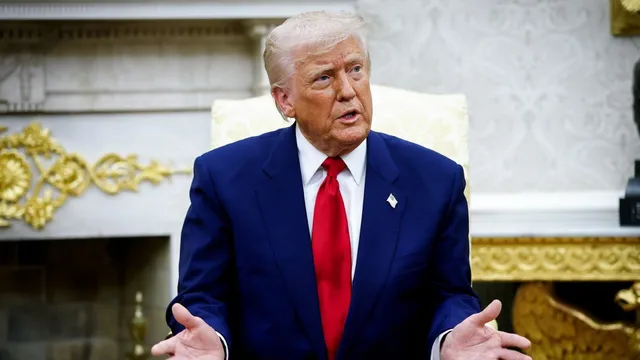
Josh Shapiro blames Trump's tariffs for rising prices in Pennsylvania
2025-04-11 21:30- Governor Josh Shapiro criticized Trump’s tariffs, identifying them as a source of chaos and price increases for consumers.
- Tariff rates on products like steel, aluminum, and a shocking 145% on Chinese imports contribute to economic uncertainty.
- The governor's statements reflect growing concerns about potential job losses and the economic stability of Pennsylvania due to these tariffs.
Express your sentiment!
Insights
In Pennsylvania, Governor Josh Shapiro criticized President Trump's tariffs during an event at the Port of Philadelphia, indicating that they have created substantial confusion and chaos in the marketplace. He emphasized that the rising costs associated with tariffs affect everyday consumers, highlighting the implications for common goods such as bananas, which must be imported from Central America. Shapiro pointed out that soaring prices are not the only concern; the uncertainty surrounding tariffs could harm long-term economic planning within the region, potentially leading to job losses for the 12,000 workers dependent on port activities. The tariffs on products such as steel and aluminum remain significant, at 25%, while those on Chinese imports have alarmingly increased to a staggering 145%. These changes have had a negative impact on the stock market, demonstrating the turbulence affecting investors and the broader economy. Michael Pearson, chairman of the Port of Philadelphia's board, noted that the unpredictability may lead businesses to hold onto their cash, consequently affecting local employment rates and economic stability. Supporters of tariffs, however, argue they are intended as leverage in negotiations with foreign nations, asserting that the broad tariffs are necessary to compel other countries to engage in discussions for fairer trade agreements. But amid this rationale, many people—especially small business owners who rely on imported goods—experience short-term pain from increased costs and uncertainty. This creates a challenge for local entrepreneurs as the market becomes rigid under the pressure of changing import duties and tariffs. As uncertainty permeates the atmospheres of trade and business, officials are left with the daunting task of navigating through the previously stable economic structures that have been disrupted by the new tariff policies. Critics, including Shapiro and Pearson, urge for a reevaluation of these strategies, emphasizing the need for transparency and clarity in governmental policies to ensure the protection of Pennsylvania workers and economic interests moving forward.
Contexts
The long-term consequences of tariffs on US markets have far-reaching implications that extend beyond immediate economic impacts. Tariffs, which are essentially taxes imposed on imported goods, are designed to protect domestic industries by making foreign products more expensive. Over time, however, these protective measures can lead to a range of unintended consequences that may affect both the economy and consumers. One major consequence is the potential for retaliation from trade partners, which can result in a trade war, further exacerbating the negative effects on many sectors of the economy reliant on exports. Such retaliation can also reduce market access for American products, disrupt supply chains, and lead to increased prices for consumers as companies pass along the cost burdens of tariffs. This can particularly impact lower-income households, as a larger share of their income is spent on essential goods and services subject to tariffs. Furthermore, the long-term application of tariffs can lead to structural changes within the economy. While initial intentions may focus on protecting certain industries, continued reliance on tariffs can inhibit innovation and competitiveness. Companies may become complacent, relying on government protections rather than investing in research and development or optimizing production processes to lower costs. This can diminish the overall growth potential of the economy, leading to stagnation in productivity and reduced economic resilience in times of global competition. Moreover, sectors heavily reliant on global supply chains may face significant challenges, as increased tariffs can disrupt the flow of materials and components necessary for production, leading to delays and increased costs. Consumer behavior is also significantly influenced by tariffs. As tariffs make imported goods more expensive, consumers may shift their purchasing decisions toward domestic alternatives, potentially benefiting local businesses. However, if domestic producers cannot meet demand or match the quality of imported goods, consumers may experience decreased product variety and increased prices. Over time, this could lead to both inflationary pressures in the economy and a reduction in overall consumer welfare. Businesses may also reconsider their market strategies, leading to potential job losses in industries that cannot compete effectively in a tariff-inflated market. In summary, while tariffs may serve as a short-term tool to protect domestic industries, their long-term consequences can have detrimental effects on the US economy. Retaliatory measures from trading partners, decreased innovation, and negative impacts on consumer behavior illustrate the complexity of imposing tariffs. Policymakers must carefully consider these ramifications to develop trade policies that foster sustainable economic growth while balancing the interests of domestic producers and consumers alike. Understanding these dynamics is crucial for navigating the future of trade relations and ensuring the long-term health of the US economy.